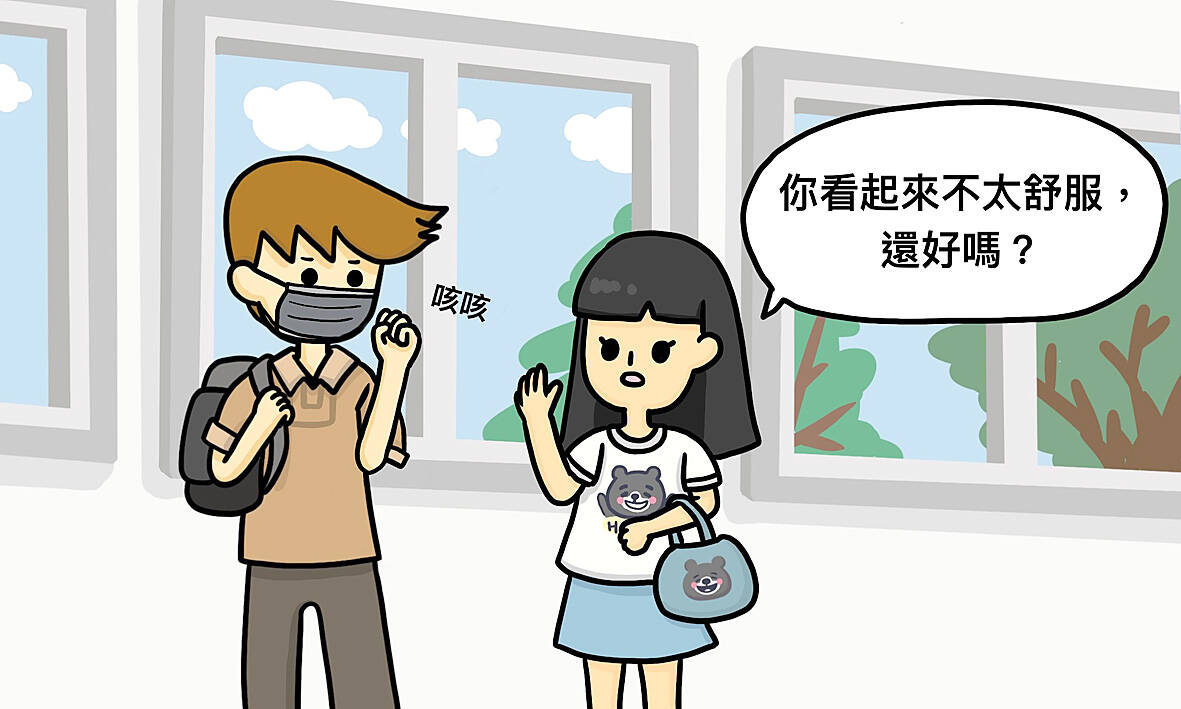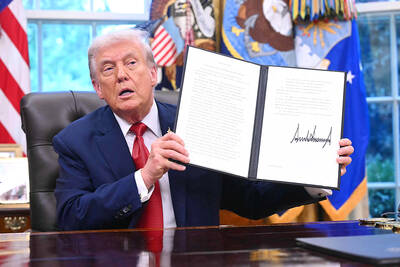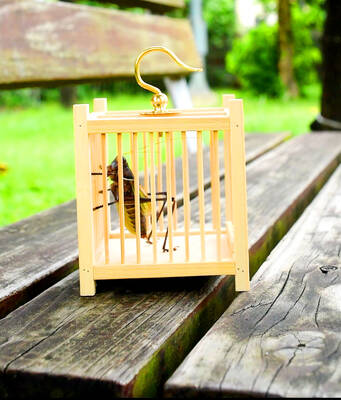對話 Dialogue
馬克:咳咳咳……。
Make: Ké ké ké. . .

小實:馬克,你看起來不太舒服,你還好嗎?
Xiaoshi: Mǎkè, nǐ kànqǐlái bú tài shūfú, nǐ hái hǎo ma?
馬克:沒事沒事,我還好,可能感冒了。
Make: Méishì méishì, wǒ hái hǎo, kěnéng gǎnmào le.
小實:你有什麼症狀嗎?有沒有發燒呢?
Xiaoshi: Nǐ yǒu shén me zhèngzhuàng ma? Yǒu méiyǒu fāshāo ne?
馬克:大概就是流鼻涕、有一點咳嗽,但是沒有發燒。
Make: Dàgài jiùshì liúbítì, yǒuyìdiǎn késòu, dànshì méiyǒu fāshāo.
小實:這樣啊,那你要去看醫生嗎?
Xiaoshi: Zhèyàng a, nà nǐ yào qù kàn yīshēng ma?
馬克:應該不用,我覺得多喝水、休息一下就好了。
Make: Yīnggāi búyòng, wǒ juéde duō hēshuǐ, xiūxí yíxià jiù hǎole.
小實:最近的氣溫不太穩定,你要多注意身體喔!
Xiaoshi: Zuìjìn de qìwēn bú tài wěndìng, nǐ yào duō zhùyì shēntǐ ō!
馬克:好的,謝謝你的關心!
Make: Hǎo de, xièxiè nǐ de guānxīn!
翻譯 Translation
Mark: [Coughing. . .]
Xiaoshi: Mark, you don’t look well. Are you okay?
Mark: It’s OK, I’m fine, I think I might have a cold.
Xiaoshi: Do you have any symptoms? Do you have a fever?
Mark: Probably a runny nose and a little cough, but no fever.
Xiaoshi: I see. Do you want to see a doctor?
Mark: Probably not, I think drinking plenty of water and getting some rest will be fine.
Xiaoshi: The temperature is not very stable recently, you should look after yourself!
Mark: OK, thank you for your concern!
單字片語 Vocabulary
1. 咳嗽 (késòu) cough
2. 看起來 (kànqǐlái) looks like
3. 症狀 (zhèngzhuàng) symptom
4. 發燒 (fāshāo) fever
5. 流鼻涕 (liúbítì) runny nose
6. 氣溫 (qìwēn) (air) temperature
7. 穩定 (wěndìng) stable
教材音檔 Audio Files
教材影片 Video Files:
https://www.instagram.com/celc.nou_tw/guide/_/17999106352646292/
實踐大學華語中心提供
By Shih Chien University Chinese Language Center: https://chineseusc.com/

The content recommendation algorithm that powers the online short video platform TikTok has once again come under the spotlight after the app’s Chinese owner ByteDance signed binding agreements to form a joint venture that will hand control of operations of TikTok’s US app to American and global investors, including cloud computing company Oracle. Here is what we know so far about its fate, following the establishment of the joint venture. IS BYTEDANCE CEDING CONTROL? While the creation of this new entity marks a big step toward avoiding a US ban, as well as easing trade and tech-related tensions between Washington and Beijing, there

A: Google has unveiled its 2025 Year in Search chart. No. 10 to No. 6 are: Typhoon Podul, Chinese drama “Love’s Ambition,” tariffs, US President Donald Trump and singer Khalil Fong’s death. B: Wow, actress Rosy Zhao’s new drama is so popular. So what are the top five? A: No. 5 to No. 1 are: Gemini, hanzii.net, NT$10,000 cash handout, entertainer Big S’ death and earthquakes. B: Hasn’t Trump topped this year’s most-searched people chart? A: Yup, and he’s closely followed by cheerleader GuoGuo Chiang at No. 2, whose husband Zack Fanchiang is also at No. 8. Apparently, people are curious about her extramarital

A: Compared to Taiwanese, what did Americans search for most in 2025? B: No. 10 to No. 6 are: Tariffs, FIFA Club World Cup, government shutdown, DeepSeek and incoming New York mayor Zohran Mamdani. A: Mamdani is set to take office on Jan. 1. And what are the top five? B: No. 5 to No. 1 are: the One Big Beautiful Bill Act, iPhone 17, Labubu doll, animated blockbuster KPop Demon Hunters and political activist Charlie Kirk’s assasination. A: The only term to appear on both the Taiwanese and US charts is tariffs. A: 跟台灣人相比,美國人都在搜尋什麼? B: 第10到6名是:關稅、FIFA俱樂部世界盃、政府關閉、DeepSeek語言模型、候任紐約市長佐蘭曼達尼。 A: 曼達尼元旦即將就任,前5名是什麼? B: 第5到1名是:《大而美法案》、iPhone 17、拉布布玩偶、動畫片《KPop獵魔女團》、政治活動家查理柯克遇刺。 A: 看來台、美熱搜榜唯一的共同議題就是--關稅! (By Eddy Chang, Taipei

The world is teeming with danger and unpredictability. To safeguard themselves from harm and invite good fortune, people across cultures carry or display symbolic charms and trinkets. It is common to see beckoning cat figurines in stores in Japan, while people in China have historically kept crickets in cages for good luck. Even flora can serve as emblems of luck, with the four-leaf clover standing out as perhaps the most iconic. A clover is a small plant that typically grows 10 to 30 cms in height. While there are many species of clover, the variety that people consider to